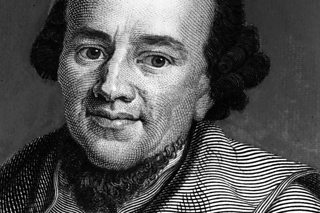Editor's note: In Thursday's programme Melvyn Bragg and his guests discussed Moses Mendelssohn. As always the programme is available to listen to online or to download and keep - EMcN.

Hello
I think that the reason I enjoyed this programme so much was that it brought into clear focus the splicing and the contradiction and the internal opposition on nature of great religion and the Enlightenment in the eighteenth century.
I've always thought it was completely simplistic to think that the Enlightenment came and wiped the slate clean of all previous knowledge. That the great knowledge systems built up by people every bit as clever as those in the Enlightenment were suddenly not fit for purpose and we had a new dawn. It seems to me that we carry the past with us wherever we go and there are few clean changes, and if so, they are brutal and short-lived and the pendulum then swings back. It's evolution and merging that brings about the eventual big changes.
Religion had a great deal to offer the Enlightenment, as enlightened people in the Royal Society, for instance, from Newton through to Priestley and Clerk Maxwell, were well aware of. In the person of Moses Mendelssohn we had a supreme example of a religious scholar and a believer in one of the great world faiths, who was also entranced by, and became part of, the Enlightenment; led, as it seemed then, solely by reason.
Of course it gets more complicated. Mendelssohn also read the work of the Scottish Enlightenment, where reason is not by any means the only instrument available to pick through the complexity of thought. In fact, it arrives second to the forces of sensation, according to the great philosopher Hume, and it is in that cauldron of sensations that love, spirituality, honest doubt, uncertainty, inexplicability, surprise by joy, and all that we shall never know but of which we have perhaps intimations, dwell. I think that Moses Mendelssohn was aware of that, but his scholarship from the commentaries on the Jewish Bible had led him into a way of thinking which had a great deal in common with the scholarship of the Enlightenment. It was fascinating - even in the short time I had - to read of the way he took on the Christian ideas, the Spinozan ideas, and the ideas of the later Enlightenment, and returned them in full measure, as well as cleaving obstinately and intellectually to his roots.
The contributors were exhilarating, I thought. It was non-stop, full throttle intellectual engagement. It was also a recording, as you may have guessed. We'd done Vitruvius about an hour beforehand. So I said I went to the office and roamed around a little. I chose one of the hottest days of spring to buy a coat in a sale. Quite a heavy coat. So that hotted things up even further. What else? Well, as I write this, I'm about to go to Australia to give a lecture on the impact of the King James Bible. When you get this, I will (I hope) have come back from Australia, having given the lecture, and be ready to get on with the history of the measurement of time.
I'll have experienced quite a bit of time on those flights. You can tell the batteries have run down by that last sentence so I'll stop now!
Best wishes
Melvyn Bragg
- Download this episode to keep from the In Our Time podcast page
- More about the In Our Time archive of podcasts to download and keep
- Sign up to receive the newsletter by email
